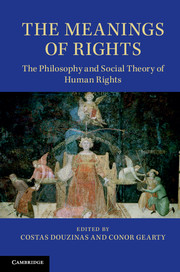Book contents
- Frontmatter
- Contents
- Notes on contributors
- Introduction
- Part I Finding foundations
- Part II Law, rights and revolution
- 5 Philosophy and the right to resistance
- 6 On a radical politics for human rights
- 7 Fanon today
- 8 Race and the value of the human
- Part III Rights, justice, politics
- Part IV Rights and power
- Index
- References
5 - Philosophy and the right to resistance
Published online by Cambridge University Press: 05 June 2014
- Frontmatter
- Contents
- Notes on contributors
- Introduction
- Part I Finding foundations
- Part II Law, rights and revolution
- 5 Philosophy and the right to resistance
- 6 On a radical politics for human rights
- 7 Fanon today
- 8 Race and the value of the human
- Part III Rights, justice, politics
- Part IV Rights and power
- Index
- References
Summary
The end of history and the dawn of a ‘new world order’ was announced in 1989. If it was a ‘new’ order, it was the shortest in history. It came to an abrupt end in 2010. Protest, riots and uprisings have erupted all over the world, both in authoritarian and in democratic places. Neither the mainstream nor the radicals had predicted the wave. This has led to a frantic search for historical precedents and to hyperbolic comparisons. Paul Mason reports that a former director of Britain’s Secret Intelligence Service thought that ‘it’s a revolutionary wave, like 1848’. Mason agrees: ‘There are strong parallels – above all with 1848, and with the wave of discontent that preceded 1914.’ Alain Badiou diagnoses a ‘rebirth of history’ in a new age of ‘riots and uprisings’ that may bring the ‘intervallic’ period that follows major revolutionary upheavals to an end. In the intervallic period, the revolutionary idea is ‘dormant’. For Badiou, this earlier period closed after May 1968, the religious turn of the Iranian revolution and the end of the Chinese cultural revolution. The interval is coming to an end. Resistance and revolution are in the air. What causes their cyclical return? This chapter examines philosophy’s hesitant exploration of the link between revolution and right. Can philosophy explain the eternal return of resistance despite law’s persistent attempt to ban it?
If for Kant Enlightenment is ‘man’s emergence from his self-incurred immaturity’, an immaturity caused by ‘lack of resolution and courage’, revolution is the condition of modernity and the autonomous individual its foundation. Political revolutions have determined modernity’s history; science and technology are in permanent upheaval; the artistic avant-garde keeps revolting and re-defining the Zeitgeist. Philosophy has dealt extensively with revolution and right. But the relationship between the two has been rather superficially examined.
- Type
- Chapter
- Information
- The Meanings of RightsThe Philosophy and Social Theory of Human Rights, pp. 85 - 105Publisher: Cambridge University PressPrint publication year: 2014
References
- 1
- Cited by



